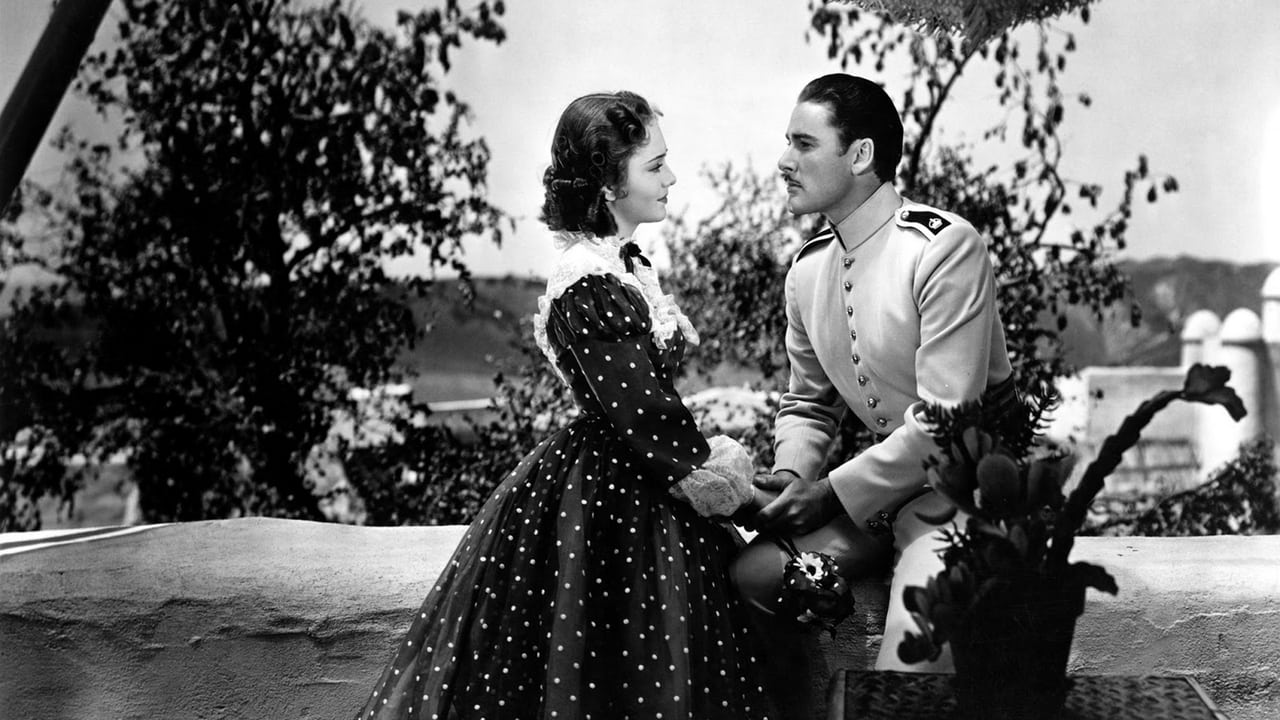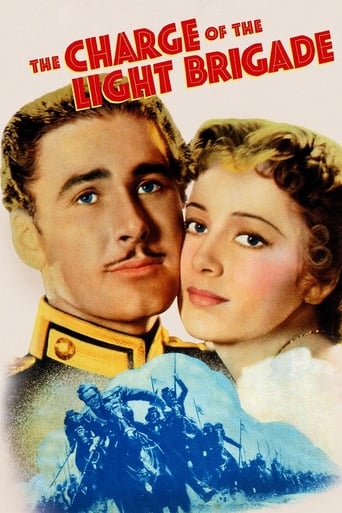

I really should hate this film. Like other Flynn films of the time, most notably "They Died With Their Boots On", it plays fast and loose with the known facts of a historical event to the extent of creating a fictitious pretext for the actual charge of the Light Brigade itself and creating imaginary characters like Flynn's Major Vickers and Indian warlord Surat Khan as the main protagonists in the battle, even the Chikoti massacre which triggered the bloody conclusion is based on events which happened three years after the Battle of Balaklava. More importantly, the now known facts about the production's incidental slaughter of numerous horses in the climactic battle scenes can make it somewhat distressing to view, as I found myself inadvertently watching for the deadly trip-wires which sent so many of them to a no doubt nasty death.That's a lot to put aside but still I can't help but admit that this is another golden-age Hollywood classic, utterly entertaining in the "Boy's Own" tradition of so many great films of that era, many of them of course synonymous with Flynn as the leading man. Here, he's at his dashing best as the honourable Major Vickers, for once giving up the love of his betrothed, the ever-present Olivia De Havilland in favour of his weedy brother, in a turn of events as hard to believe as anything else in the fanciful script, who, to revenge the slaughtered innocents by the barbarous Khan, countermands official orders to lead the suicidal attack of his brave 600 cavalrymen into the valley of death, where Flynn inevitably expires in the knowledge that he has at least avenged Khan personally.Excusing director Curtiz's heartless treatment of the poor horses, one can't deny his ability in managing the sheer spectacle of both the massacre at Chikoti and especially the final carnage at Balaklava. In the days before C-Gen special effects capable of creating imaginary thousands in battle, here you actually see, especially in the long-shots, the actual blood and thunder of war in the raw, which makes the heart race just to watch it.Flynn is of course imperious as the gallant Vickers and there's good support for him too in the familiar forms of De Havilland, Nigel Bruce and in a fairly brief role, the young David Niven. No, they don't make them like this anymore, thankfully in respect of the treatment of animals on set, but regrettably in terms of sheer action and story-telling.
... View MoreAt the beginning the tale is set in Suristan , it could be seen as part of the "Great game" that was fought for nearly a century between the British and Russian empires for control in the Middle East . After that , a massacre takes place at Chukoti , it seared into the minds of the 27th Lancers , a livid scar never to heal . International events , however , were soon to overshadow it in the world at large ; for the hounds of war had been unleashed and England was pouring troops into the Crimea to oppose the Russian hordes , the wave of war preparations swept into Calcuta . This drama deals with the chronicle of events that led to the British involvement in the Crimean War against Russia . In Balaklava is the Allied Headquarters , Army of the Crimea , and the new post of the 27th Lancers . Later on , occurs the siege of Sevastopol and the fierce ¨Battle of Balaklava¨ on October 25, 1854 which climaxed with the heroic, but near-disastrous cavalry charge made by the British Light Brigade against a Russian artillery battery in a small valley which resulted in the near-destruction of the brigade . As military minds blunder and six hundred Britishers , sabers flashing , ride to their deaths . The film is dedicated "to the officers and men of the Light Brigade who died victorious in a gallant charge at Balaklava for Queen and Country - A.D. 1856." It is based on Lord Tennyson's famous poem : Half a league , half a league onward , all in the valley of death rode the six hundred . Cannon to right of them , cannon to left of them , cannon in front of them volley'd and thunder'd . ¨Forward , the Light Brigade ¡ Charge of the guns¨ he said , into the valley of death rode the six hundred . When can their glory fade ? O the wild charge they made ¡ All the world'd . Honor the charge they made ¡ Honor the Light Brigade , Noble Six Hundred ¡ . Good film with lavish production values dealing with events leading up to British involvement in Crimean war with stunning final battle sequence . This epic movie contains feats , a romantic love story , adventures , thundering action , thrills , and historical events . The film was originally set entirely in India, but the Crimean War was added due to fears by Warner Brothers that the story was too similar to Paramount's The lives of a Bengali Lancer (1935). Exquisitely made battle scenes being magnificently directed by action specialist B. Reeves Eason . Although during the filming of the charge sequence, a stuntman was killed when he fell off his horse and landed on a broken sword that was lying on the battlefield . The original script used the real-life siege of a British fort at Cawnpore , and subsequent massacre of its survivors , during the Sepoy Rebellion -, a nationwide mutiny of Indian soldiers in the British army - as the reason for the famous Charge of the Light Brigade at Balaklava during the Crimean War . The second of nine movies made together by Warner Brothers' romantic couple Olivia de Havilland and Errol Flynn , here playing star-crossed lovers . The success of this film set the seal on Olivia and Errol Flynn's super-stardom . The support cast is frankly excellent such as Patrick Knowles , David Niven , C. Henry Gordon , Henry Stephenson , Nigel Bruce , Donald Crisp , EE Clive , Roger Barrat and J. Carrol Naish . The picture climaxes with one of the most dramatic and immortal cavalry charges in history . For the filming of the climactic charge, 125 horses were trip-wired ; of those, 25 were killed outright or had to be put down afterward . Superb and evocative cinematography in black and white by Sol Polito , though is also shown in a lousy computer-colored version . Breathtaking score by the maestro Max Steiner in his first one for Warner Brothers . The motion picture produced in big budget by Hal B. Wallis , Harry Warner and Jack Warner was compellingly realized by Michael Curtiz .
... View MoreThis is a beautifully filmed adventure with a romantic triangle that sets up a rivalry between two brothers (Errol Flynn and Patric Knowles) for their commander's daughter (Olivia de Havilland). When the commander (Donald Crisp) finds out that Knowles is interested in his daughter, he hits the fan, sure that de Havilland and Flynn are certain to be married. His own daughter tries to correct him on the situation to no avail, and as a result, the two brothers become estranged. They learn that the local mountain leader (C. Henry Gordon in one of his most nefarious roles) plans an attack after initially greeting them warmly and is in cahoots with one of their Russian enemies. A surprise attack on their compound leaves hundreds dead, and the brigade must send for reinforcements which leads to one of the most exciting conclusions to a war movie ever made.While some movies like this tend to make the romantic aspect of the plot seem unnecessary to the structure as a whole, in this film, it is very well utilized, and as a result, the character that de Havilland plays is important overall, not just frivolous window dressing. That aspect (especially the frivolous part) goes to Spring Byington whose involvement seemed to be to supply comic relief that never came. As the nagging wife of Nigel Bruce, she comes off as totally obnoxious, always cheerful when demanding he take another pill and put down the drink, and always annoying. Bruce does get a good jab at her when he simply says in front of her to de Havilland and Knowles that she seems to get her jollies interfering in everybody else's life.If you have a slightly sardonic side (as I do), you may hear Alfalfa from "The Little Rascals" reciting the poem as he does in one of the "Our Gang" shorts. (I didn't know the poem by heart so it wasn't until seeing this again that I realized the poem starts off "Half a League", not "Half a Leg" as I could swear Alfalfa had said.) By the time the movie gets to the part where the poem comes up on the screen, you are emotionally entrenched in the outcome, and rather than make this dramatically silly, the usage of the poem makes it all the more riveting. In other supporting roles, David Niven and Henry Stephenson stand out, and Gordon's villain is quite memorable, his final moments destined to give you chills. Michael Curtiz directed this with aplomb, and photographer Sol Polito never lets the camera stand still at any moment. The outstanding art direction and costumes also deserve praise.
... View MoreI give it a decent grade for action and drama. But like the poem of the same name, the movie glorifies a fine example of stupidity. The charge accomplished nothing militarily. While the brigade was not completely destroyed, it suffered terribly, with 118 men killed, 127 wounded and about 60 taken prisoner. After regrouping, only 195 men still had horses. The futility of the action and its recklessness prompted the commanding French Marshal Pierre Bosquet to state: "It is magnificent, but it is not war. It is madness." The Russian commanders believed that the British soldiers were drunk.So, the next time someone says, "Ours is not to reason why, ours but to do & die," remind them that it's from a poem about a military suicide run.
... View More